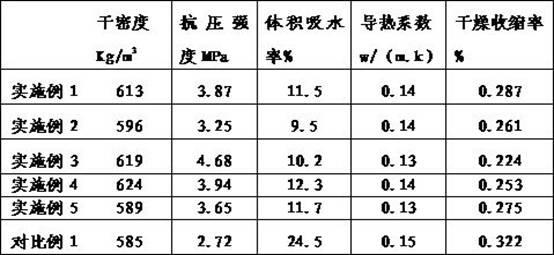Flame retardant heat-insulation foam concrete and preparation method thereof
A foamed concrete, flame-retardant and thermal insulation technology, applied in ceramic products, other household appliances, applications, etc., can solve the problems of restricting the popularization and application of foamed concrete materials, easy to absorb water, crack, and shrink, and achieve excellent thermal insulation performance and shrinkage. Low, reduced volume shrinkage effect
- Summary
- Abstract
- Description
- Claims
- Application Information
AI Technical Summary
Problems solved by technology
Method used
Image
Examples
Embodiment 1
[0059] Flame retardant and thermal insulation foam concrete 1 is prepared according to the following mass ratio: 40 parts of cement, 42 parts of fly ash, 18 parts of mineral powder, 0.2 part of melamine superplasticizer, 0.03 part of cellulose ether with a viscosity of 10,000, and 0.2 part of silane water repellent , 4.8 parts of gypsum, 0.08 part of polypropylene fiber, 0.20 part of vegetable protein foaming agent, and 0.33 part of water.
[0060] The preparation method is as follows:
[0061] First mix the cement, fly ash, mineral powder, modified component water reducer, cellulose ether, water repellent, gypsum, and polypropylene fiber to make a dry powder; dilute the foaming agent with water, Use an air compression foaming machine to make the foaming agent aqueous solution into a foam; add an appropriate amount of water to the dry powder and stir it, and the slurry is required to be uniform without agglomeration and large particles; take the prepared foam and add it to the...
Embodiment 2
[0063] Flame-retardant thermal insulation foam concrete 2 is prepared according to the following mass ratio: 50 parts of cement; 25 parts of fly ash; 25 parts of mineral powder; 0.4 part of naphthalene-based water reducer; 0.4 parts of agent; 2 parts of gypsum; 0.16 parts of polypropylene fiber; 0.21 parts of animal protein foaming agent; 0.31 parts of water.
[0064] The preparation method is the same as in Example 1.
Embodiment 3
[0066] Flame-retardant thermal insulation foam concrete 3 is prepared according to the following mass ratio: 60 parts of cement; 12 parts of fly ash; 28 parts of mineral powder; 0.3 part of naphthalene-based water reducer; 0.2 parts of agent; 1.2 parts of gypsum; 0.24 parts of polypropylene fiber; 0.20 parts of animal protein foaming agent; 0.32 parts of water.
[0067] The preparation method is the same as in Example 1.
PUM
| Property | Measurement | Unit |
|---|---|---|
| viscosity | aaaaa | aaaaa |
| length | aaaaa | aaaaa |
Abstract
Description
Claims
Application Information
 Login to View More
Login to View More - R&D
- Intellectual Property
- Life Sciences
- Materials
- Tech Scout
- Unparalleled Data Quality
- Higher Quality Content
- 60% Fewer Hallucinations
Browse by: Latest US Patents, China's latest patents, Technical Efficacy Thesaurus, Application Domain, Technology Topic, Popular Technical Reports.
© 2025 PatSnap. All rights reserved.Legal|Privacy policy|Modern Slavery Act Transparency Statement|Sitemap|About US| Contact US: help@patsnap.com

